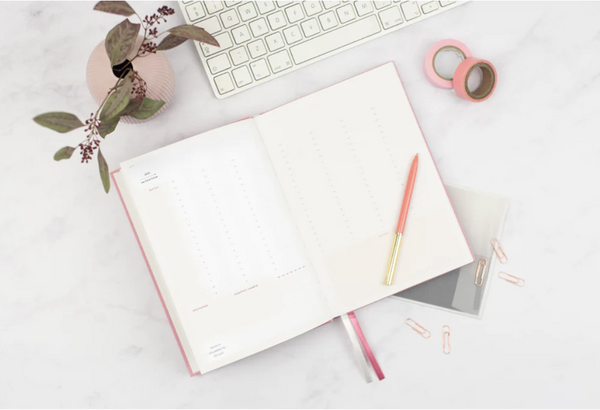Most of us have some sort of system whereby we look at our calendar planner for the week ahead and note particular events which we need to remember and possibly prepare for. This should be effective but when life happens we can end up feeling overwhelmed so making a plan seems to me that ‘one more thing’ to do. Things which should be important, for example, maintaining a regular gym or fitness routine, tend to fall by the wayside when the daily demands of family and working life just seem to take over.
Similarly, we often find ourselves too busy to make space for mundane, but important, things like grocery shopping at your favourite food store. Yes, food shopping and menu planning is a little dull but without planning, we may find ourselves relying on regular late evening runs to the convenience store for prepackaged meals which can end up being both expensive and not to mention, not aligned with our health goals.
This is where some intention or strategy in our diary planning can help enormously. Simply setting aside some time to plan your planning (yes, I appreciate the irony!) can really help give clarity and focus to the weeks ahead.
Here are some tips to get you started:
- First, set aside a good 30 minutes to have a think about what the next few weeks are expected to bring. Set an intention for your planning period. Thsi could be, asking yourself: am I going to have a busy week? If the answer is yes, think about intentionally building in time in between meetings to give you breathing room. Remember: you're in charge, here.
- Think about what’s upcoming and what you need to be prepared for it. I like to have both my planner and the family calendar with details of school holidays, children’s clubs etc, in front of me when I do this. If you have a partner, you might also find it helpful to have their calendar close to hand too. Do you have everything you need for a particular trip your family might be going on? Do you need any extra grocery shopping if you’re having friends to stay? Is it you or your partner, or both of you, who will be attending your child’s sports day or school summer fair and are you expected to bring anything with you (picnic, batch of home-baked cookies, etc?).
Now, for the intention part!
- Try and think about balance. We often get very focussed on completing client work, and sometimes neglect the work our own business needs, or to keep up to date with our own learning and development. Do you need to set aside time for regular website maintenance, or marketing mail outs, or networking events?
- Factor in your own energy levels. Working late three evenings a week, going to the gym for an hour every day, and then a ten mile bike ride with the family at the weekend might look good in your diary planner, but is it really feasible or sustainable? Schedule in non-negotiable time that’s spent on activities that nourish and recharge you. For example, as I put my kids to sleep (I sit in their room for about 30 min until they fall asleep) I listen to a 10-minute guided meditation. This allows me to prepare myself for the second part of my evening and sometimes, I get a boost of creativity!
- Think about the wider draws on your time. In my experience Christmas and late summer tend to be the busiest times for school and social events at which parents are expected to attend. If your partner is a big sports fan or has a particular hobby which takes them away from home, do you need to schedule around that?
Now create an inventory of both the things which take up chunks of your time and the things for which you wish had more time. This will help you identify what is important to you. Your list might include some of the following:
- Family time
- Gym or other fitness time
- Time alone with your partner
- Professional development time - e.g. catching up with industry news or taking a course online
- Hobbies
- Shopping, cooking, home-making time
- Time with friends
- Preparation time for client meetings / kids activities
- Rest and recharge time
You should now have a good idea of both what needs scheduling, and how much time you can reasonably allocate.
- I tend to work on a monthly basis so at the beginning of the month I might sit down with my Ponderlily planner and:
- Block out the time that I know I’m not going to be available e.g. school events/weekends when I want to spend time with my family/specific time set aside for my own interests.
- Add in the dull but important things, e.g. gym/grocery shopping/catching up with my industry news and reading.
- Now I can see exactly how much time I reasonably have left over to schedule in client work and my own business development.
It sounds very complicated but, trust me, once you start planning smarter, you won’t look back! Want to have a read at how I plan my week?
And finally, don’t forget to schedule time for your own rest and relaxation. Former US presidents John F. Kennedy and Ronald Regan, and former UK Prime Minister, Margaret Thatcher, reportedly always made time for a short rest during a long and busy working day!
“What do you think of intentional diary planning? Is this something you have tried or would like to try?” If you’d like some help getting started, slide into our Instagram DMs so we can chat and send additional resources your way.




